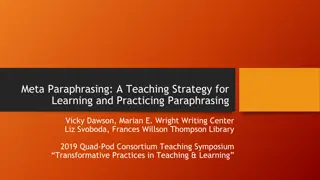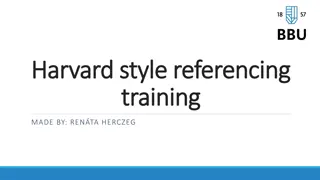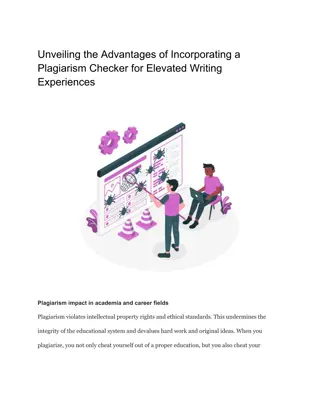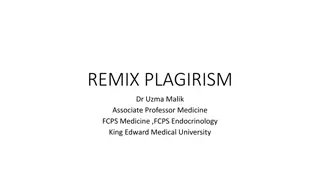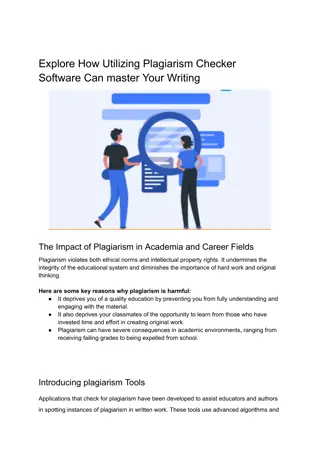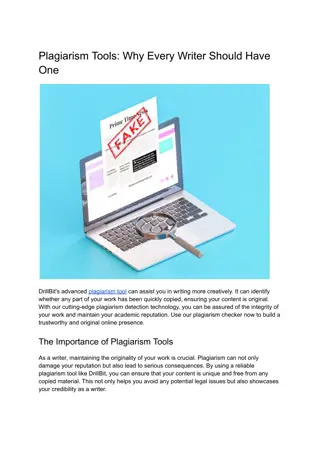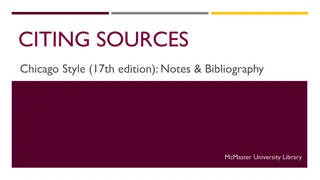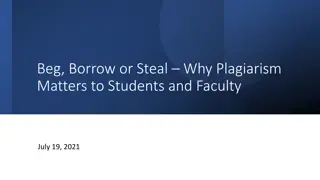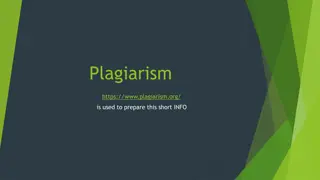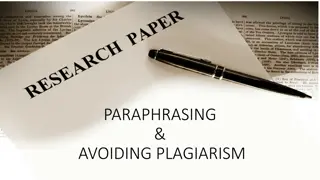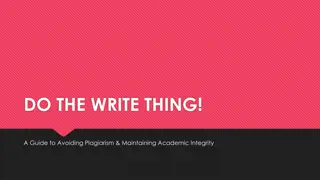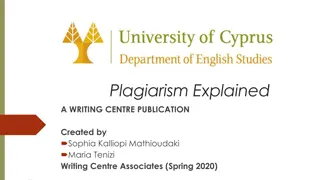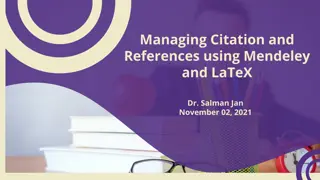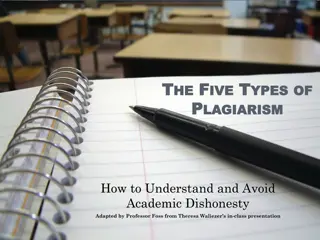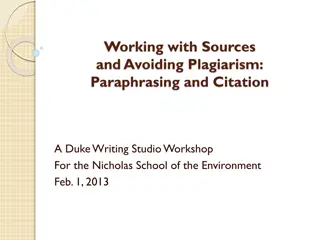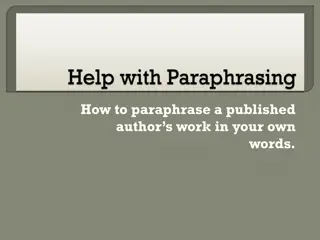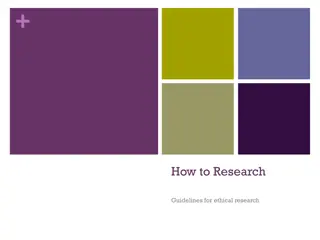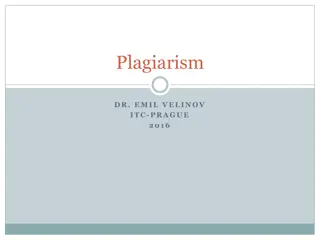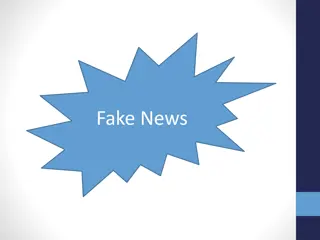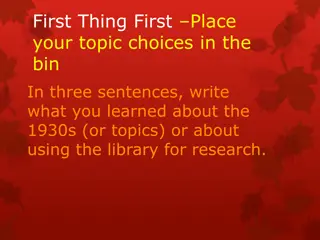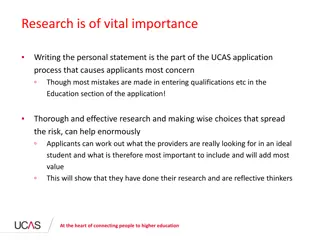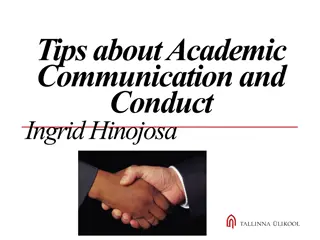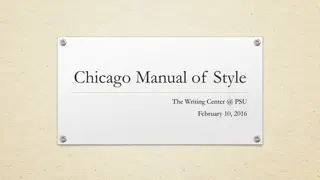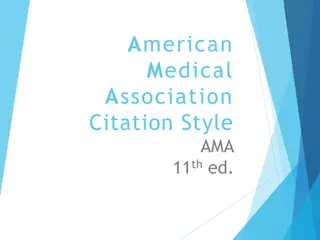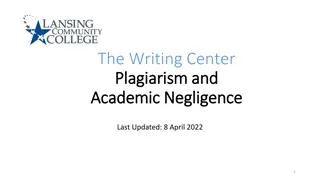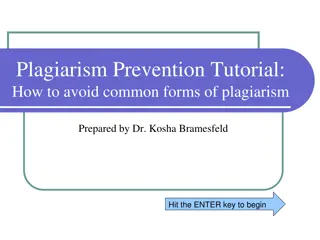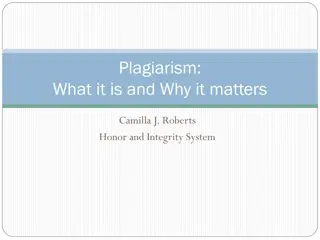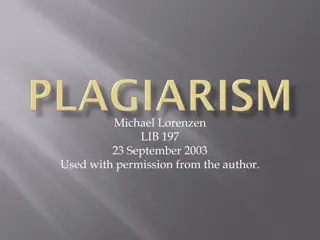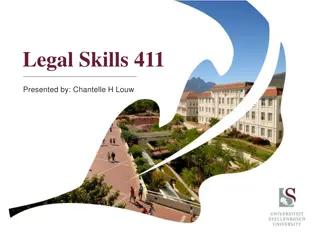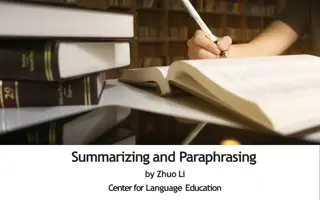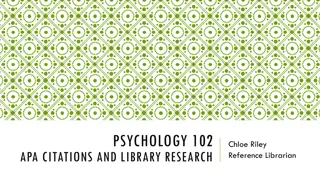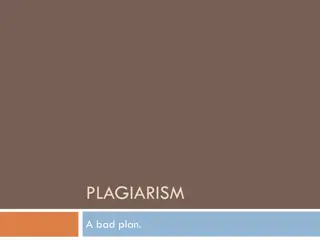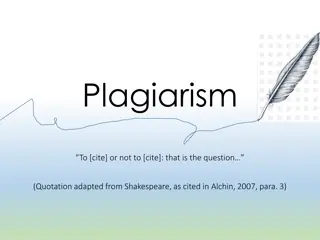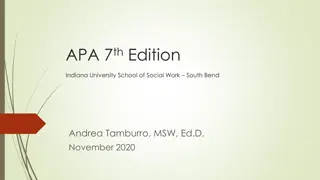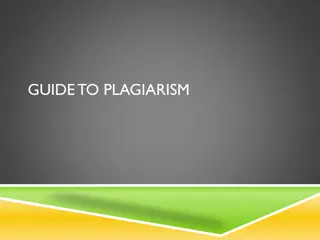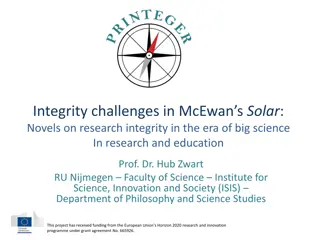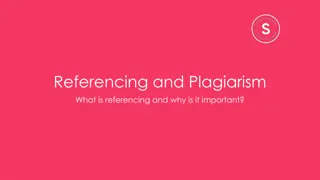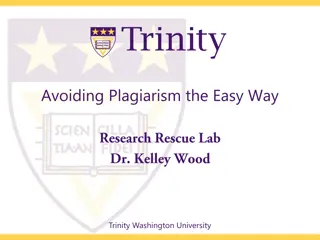Meta Paraphrasing: A Teaching Strategy for Learning and Practicing Paraphrasing
Paraphrasing is a vital skill that demonstrates understanding, allows integration of ideas ethically, and enhances credibility. This strategy involves proper analysis, using one's words, and citing sources accurately to avoid plagiarism.
5 views • 18 slides
Harvard Style Referencing and Avoiding Plagiarism
Learn about Harvard referencing style, the importance of avoiding plagiarism, and how to create in-text references properly. Understand the BBU FCHT Harvard system for author-year method referencing and how to cite books and book chapters effectively.
1 views • 24 slides
Unveiling the Advantages of Incorporating a Plagiarism Checker
Use DrillBit's powerful plagiarism tool to learn how to write more creatively. Determine whether any of your work has been copied quickly and make sure it is original. With our plagiarism tool, you may feel certain about the integrity of your work and academic standing. To establish a reliable and u
0 views • 6 slides
Understanding Plagiarism: A Comprehensive Overview
Plagiarism, specifically remix plagiarism and paraphrasing plagiarism, is discussed in detail, highlighting the act of presenting others' work as one's own without proper acknowledgment. It covers types of plagiarism, consequences, and examples to enhance understanding of this academic misconduct.
0 views • 11 slides
Explore How Utilizing Plagiarism Checker Software Can master Your Writing
Utilize our advanced plagiarism checker software to enhance the originality of your writing. Effortlessly identify any copied content and ensure the uniqueness of your work. Our Plagiarism Checker Software is designed to protect your academic integrity and your content. Experience the benefits of Dr
0 views • 4 slides
Plagiarism Tools: Why Every Writer Should Have One
Explore our advanced plagiarism checker software to enhance the originality of your writing. Easily identify any plagiarized content and guarantee the uniqueness of your work. Our Plagiarism Checker Software is designed to protect both your academic integrity and your content. Experience the benefit
10 views • 4 slides
Understanding the Importance of Citing Sources in Chicago Style
Citing sources in Chicago Style (17th edition) is crucial to credit authors, avoid plagiarism, and provide readers with access to your research sources. This guide covers why to cite, when to cite, citation styles, Chicago Style notes and bibliography, in-text and endnotes, and creating a bibliograp
0 views • 10 slides
Understanding Plagiarism: Importance and Strategies for Students and Faculty
Explore the significance of plagiarism in academic settings and learn strategies to educate students on avoiding it. Discover best practices for addressing suspected cases of plagiarism and find resources for faculty and students to promote academic integrity.
0 views • 18 slides
Understanding Plagiarism: Definition, Consequences, and Prevention
Plagiarism involves stealing and presenting someone else's work as your own, which can have serious academic repercussions such as failing grades, disciplinary actions, or even expulsion. It is crucial for students to understand what constitutes plagiarism and how to avoid it to maintain academic in
0 views • 6 slides
Mastering Paraphrasing to Avoid Plagiarism
Paraphrasing is a valuable skill that allows writers to express ideas in their own words while giving credit to original sources. By following specific steps and practicing examples, one can effectively paraphrase complex information and enhance understanding. The process helps in retaining the esse
0 views • 13 slides
Avoiding Plagiarism and Upholding Academic Integrity
Understand what plagiarism is and the consequences associated with it. Learn to identify signs of plagiarism and differentiate between good and bad use of sources. Find out why avoiding plagiarism is crucial for academic success.
0 views • 27 slides
Understanding Plagiarism: Types, Examples, and Prevention Techniques
Plagiarism is a serious academic offense that involves using someone else's work without proper acknowledgment. This publication delves into the different forms of plagiarism - intentional and accidental, such as self-plagiarism, and provides examples to help readers understand what constitutes plag
0 views • 21 slides
Ethics in IT-Configured Societies: Google's Controversy and Plagiarism Detection
In Chapter 3 of 'Ethics in IT-Configured Societies', various scenarios are explored such as Google's filtering practices in China and France, the ethical implications of filtering hate speech and political speech, questioning the need to know if a respondent is human or computer in instant messaging
0 views • 31 slides
Managing Citation and References Using Mendeley
Explore the benefits of Mendeley and LaTeX for efficient citation and reference management, understand the importance of proper citations to avoid plagiarism, and learn how to utilize Google Scholar and Mendeley Desktop for effective research organization.
5 views • 16 slides
Understanding and Avoiding Plagiarism: Types, Consequences, and Prevention
Understand the five types of plagiarism, from intentional to unintentional, and learn how to identify, avoid, and properly cite sources to prevent academic dishonesty. Explore techniques for paraphrasing, quoting, and documentation styles like MLA and APA to ensure academic integrity.
5 views • 12 slides
Mastering Source Usage and Avoiding Plagiarism: Essential Guidelines
Effective paraphrasing and proper citation are crucial to avoid plagiarism. Understanding when to use direct quotations, paraphrases, or summaries helps maintain originality in research papers. Proper citation formats, in-text citations, and reference lists are essential components. Remember, a good
0 views • 12 slides
Effective Techniques for Paraphrasing Academic Work
Paraphrasing published author's work requires time, understanding, and persistence. Recognize the distinction between quoting and paraphrasing, emphasizing the importance of citations. Avoid excessive quoting in social sciences, preferring paraphrasing. Spend ample time reading and discussing ideas
0 views • 23 slides
Ethical Research Guidelines and Citation Best Practices
Learn how to conduct ethical research with guidelines on finding reliable sources, taking notes without plagiarizing, and creating a works cited page using tools like Citation Machine. Avoid plagiarism by properly citing sources and organizing research information effectively.
2 views • 10 slides
Understanding Plagiarism and Its Consequences
Plagiarism is presenting others' work as your own, intentional or not. It breaches integrity and can lead to severe penalties like termination or expulsion. Avoiding plagiarism is crucial for developing your voice and credibility.
0 views • 16 slides
Understanding Referencing in Academic Writing
Explore the importance of referencing in academic writing, how to cite sources properly using the Harvard system, and avoid plagiarism. Learn what information is needed for referencing and how to create reference lists and bibliographies.
0 views • 19 slides
Understanding Plagiarism and Proper Citation Techniques
Plagiarism is a serious academic offense that involves using someone else's work without proper acknowledgment. This includes copying text from the internet without citation or failing to use quotation marks when quoting an author. It is important to cite sources correctly, even when summarizing or
0 views • 38 slides
Importance of Research in Writing UCAS Personal Statements
Crafting a personal statement for UCAS applications is a critical step that often causes applicants stress. Mistakes commonly occur in the Education section, but thorough research and strategic choices can greatly enhance an application. By understanding what providers seek in an ideal candidate, ap
1 views • 19 slides
Essential Tips for Academic Communication and Conduct
Understand the consequences of cheating and plagiarism in academic settings, follow proper email etiquette, respect office protocols, dress appropriately, and be aware of the stages and symptoms of culture shock when studying abroad. Maintain good academic practices to avoid penalties, respond to em
0 views • 16 slides
Mastering Chicago Manual of Style for Effective Writing
Learn the importance of using the Chicago Manual of Style in academic writing, understand basic formatting guidelines, and explore sample papers in both Author-Date and Notes & Bibliography styles. Enhance your credibility, avoid plagiarism accusations, and structure your papers correctly for higher
0 views • 39 slides
Understanding AMA Citation Style for Effective Academic Writing
Learn about the American Medical Association (AMA) citation style, its importance in academic writing, what needs to be cited, and how to format in-text citations and references according to AMA guidelines. Discover why AMA style is crucial in the medical and allied health sciences fields, and how t
0 views • 22 slides
Understanding Plagiarism and Academic Negligence in Academic Writing
This content discusses the definitions of plagiarism and academic negligence, the importance of citing sources, and the consequences of academic dishonesty according to the LCC Student Code of Conduct. It emphasizes the necessity of acknowledging sources to give credit, establish credibility, and av
0 views • 32 slides
Plagiarism Prevention Tutorial: How to Avoid Common Forms of Plagiarism
This tutorial by Dr. Kosha Bramesfeld provides valuable insights on understanding, preventing, and avoiding plagiarism. Learn about the various forms of plagiarism, the importance of citing sources, using APA style, paraphrasing, and creating references to maintain academic integrity. Avoid the seve
0 views • 78 slides
Understanding Plagiarism: Importance and Consequences
Plagiarism involves copying someone else's work without giving proper credit, which can have serious repercussions like academic penalties and loss of credibility. It's crucial to distinguish between paraphrasing, proper citation, and original content creation to uphold academic integrity.
0 views • 22 slides
Avoiding Plagiarism: Essential Guidelines for Ethical Writing
Understand the importance of avoiding plagiarism by giving credit to the original sources. Learn how to properly cite and paraphrase content to maintain academic integrity and ethical writing practices. Be cautious about using others' ideas without acknowledgment to prevent unintentional plagiarism.
0 views • 11 slides
Guidelines for Avoiding Plagiarism in Legal Studies
Understanding and implementing proper citation practices is crucial to avoid plagiarism in legal studies. The guidelines presented emphasize the importance of citing sources, whether it be ideas, words, or previously published work. Failure to attribute sources properly can result in academic miscon
0 views • 14 slides
Effective Techniques for Summarizing and Avoiding Plagiarism
Effective strategies for summarizing include understanding the text, selecting relevant information, and rewriting main ideas in your own words. To avoid plagiarism, utilize direct quotations with proper citations, practice paraphrasing, and synthesize information from various sources. A good summar
0 views • 19 slides
Mastering APA Citations and Avoiding Plagiarism in Research
Understanding the importance of citations in academic writing, this resource provides insights on plagiarism, summarizing vs. paraphrasing, patchwriting, and working with APA Style. Discover how to effectively cite sources, prevent unintentional plagiarism, and enhance your research skills.
0 views • 21 slides
Understanding Plagiarism: Types, Consequences, Referencing, and Paraphrasing
Plagiarism involves using someone else's work without acknowledgment, with intentional and unintentional forms. It can lead to severe consequences. Referencing and paraphrasing are key strategies to avoid plagiarism, using the Harvard Author-Date method. Proper in-text referencing and citation are c
0 views • 26 slides
Understanding Plagiarism: Definition, Consequences, and Detection
Plagiarism, using words or ideas without proper credit, can result in severe penalties such as failing an assignment or even expulsion. This article discusses the definition of plagiarism, its consequences, excessive collaboration, and the importance of academic integrity in referencing sources. Add
0 views • 15 slides
Understanding Plagiarism: Citing Sources Ethically
Plagiarism is a serious offense that involves stealing ideas or words without proper attribution. Learn about the definition of plagiarism, Plymouth State University's plagiarism policy, and examples of plagiarism. Understand the importance of crediting sources and avoiding academic dishonesty.
0 views • 20 slides
Effective Writing Strategies for Social Work Professionals
Learn essential guidelines for scholarly and professional writing, including accurate punctuation, spelling, grammar usage, critical analysis, evidence-based arguments, and avoiding plagiarism. Understand the types of reports social workers write, importance of proofreading and editing, and the cons
0 views • 63 slides
Understanding Plagiarism: Types, Consequences, and How to Avoid It
Explore the comprehensive guide on plagiarism covering its definition, types, consequences, and prevention strategies. The content delves into self-plagiarism and offers tips to steer clear of academic misconduct. Learn about policies, quizzes, and common misconceptions regarding plagiarism.
0 views • 15 slides
Integrity Challenges in McEwan's Solar: Novels on Research Integrity in the Era of Big Science
This project explores the theme of research integrity in Ian McEwan's novel "Solar," delving into the ethical dilemmas faced by academics in the era of big science. It examines issues like scientific plagiarism, power dynamics in research, and ethical responsibilities of researchers. The narrative r
0 views • 12 slides
Importance of Referencing and Avoiding Plagiarism in Academic Writing
Referencing is vital to give credit, avoid plagiarism, and guide readers to further resources. Plagiarism, whether reckless or deliberate, is considered cheating and must be avoided to maintain academic integrity. Understanding when and how to reference is crucial in academic assignments.
0 views • 8 slides
Mastering the Art of Avoiding Plagiarism
Learn about the significance of avoiding plagiarism and the easy ways to do so, as demonstrated by Trinity Washington University. Explore in-depth discussions on why plagiarism is a concern and gain valuable insights to steer clear of this academic misconduct. Dive into practical tips and strategies
0 views • 38 slides
